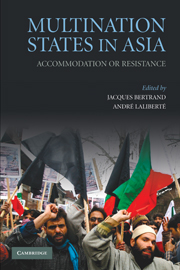Book contents
- Frontmatter
- Contents
- List of Tables and Figures
- List of Maps
- List of Contributors
- Acknowledgments
- Maps
- 1 Introduction
- 2 Revolutionary State Formation and the Unitary Republic of Indonesia
- 3 The Crisis of Border States in India
- 4 Pakistan: Neither State Nor Nation
- 5 Constitutional Politics and Crisis in Sri Lanka
- 6 The Dilemmas of Burma's Multinational Society
- 7 The Double-Edged Sword of Autonomy in Indonesia and the Philippines
- 8 China and the Virtual Taiwan Nation
- 9 The Failure of Ideologies in China's Relations with Tibetans
- 10 Leninism's Long Shadow in Central Asia
- 11 Conclusion
- References
- Index
2 - Revolutionary State Formation and the Unitary Republic of Indonesia
Published online by Cambridge University Press: 05 June 2012
- Frontmatter
- Contents
- List of Tables and Figures
- List of Maps
- List of Contributors
- Acknowledgments
- Maps
- 1 Introduction
- 2 Revolutionary State Formation and the Unitary Republic of Indonesia
- 3 The Crisis of Border States in India
- 4 Pakistan: Neither State Nor Nation
- 5 Constitutional Politics and Crisis in Sri Lanka
- 6 The Dilemmas of Burma's Multinational Society
- 7 The Double-Edged Sword of Autonomy in Indonesia and the Philippines
- 8 China and the Virtual Taiwan Nation
- 9 The Failure of Ideologies in China's Relations with Tibetans
- 10 Leninism's Long Shadow in Central Asia
- 11 Conclusion
- References
- Index
Summary
Recent trends in Europe whereby established states have surrendered some powers toward a supranational Europe, on the one hand, and sub-national regions on the other, make it possible to speak of a relaxation of the “sovereign equality” model that dominated the post-war world in which nation-states were presumed to be the sole and equal possessors of sovereignty. We should, however, be very careful about generalizing this globally. In particular, the new states of Asia have been in an intense period of nation-building since 1945. The type of nationalism which Tønnesson and Antlov (1996) label “official,” I prefer to call “state nationalism” to avoid Anderson's (1991) negative use of the term, since it is the universal currency of states in seeking to create loyalty and homogeneity (Reid 2009). This type is still extremely vigorous in Asia, where the task of turning “peasants into Chinese” (or Indians, Indonesians, etc.) is by no means complete. The acceptance by China in 1997 and Indonesia in 2005 of a certain degree of asymmetry in the position of Hong Kong and Aceh, respectively, may look like pragmatic retreats from the nationalist project, but there is still profound resistance in both these states toward recognizing the validity of self-governing “nations” within established states.
It would be wrong to see this difference, however, as a consequence of either Asian cultural norms or long-term patterns of Asian statecraft.
- Type
- Chapter
- Information
- Multination States in AsiaAccommodation or Resistance, pp. 29 - 50Publisher: Cambridge University PressPrint publication year: 2010
- 5
- Cited by



